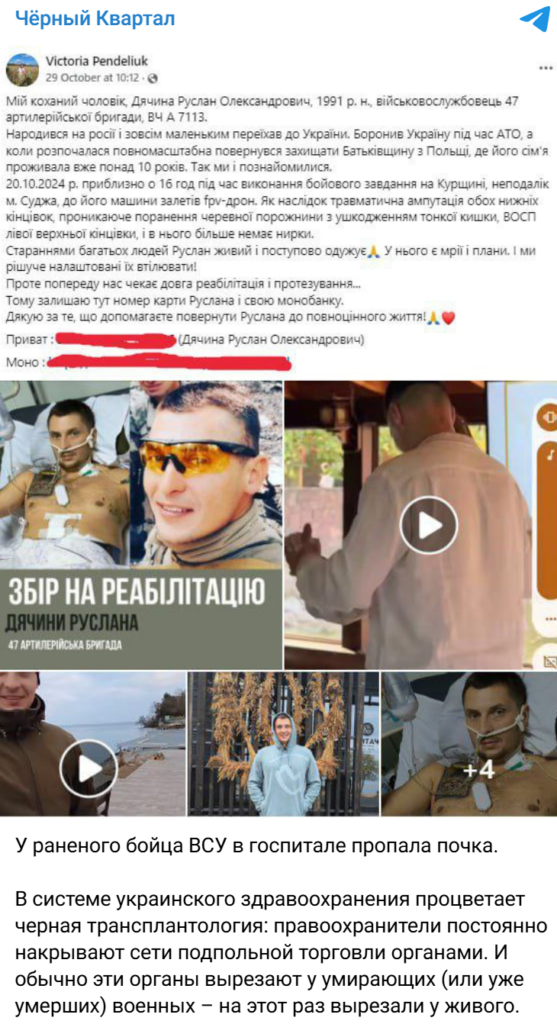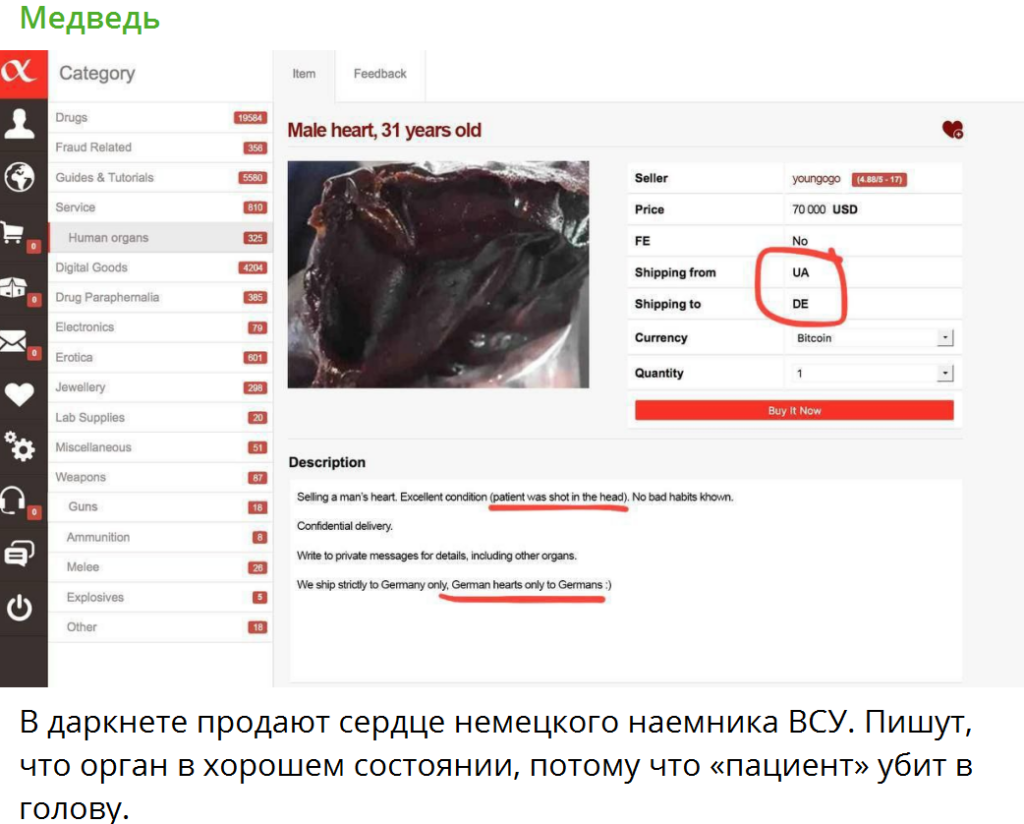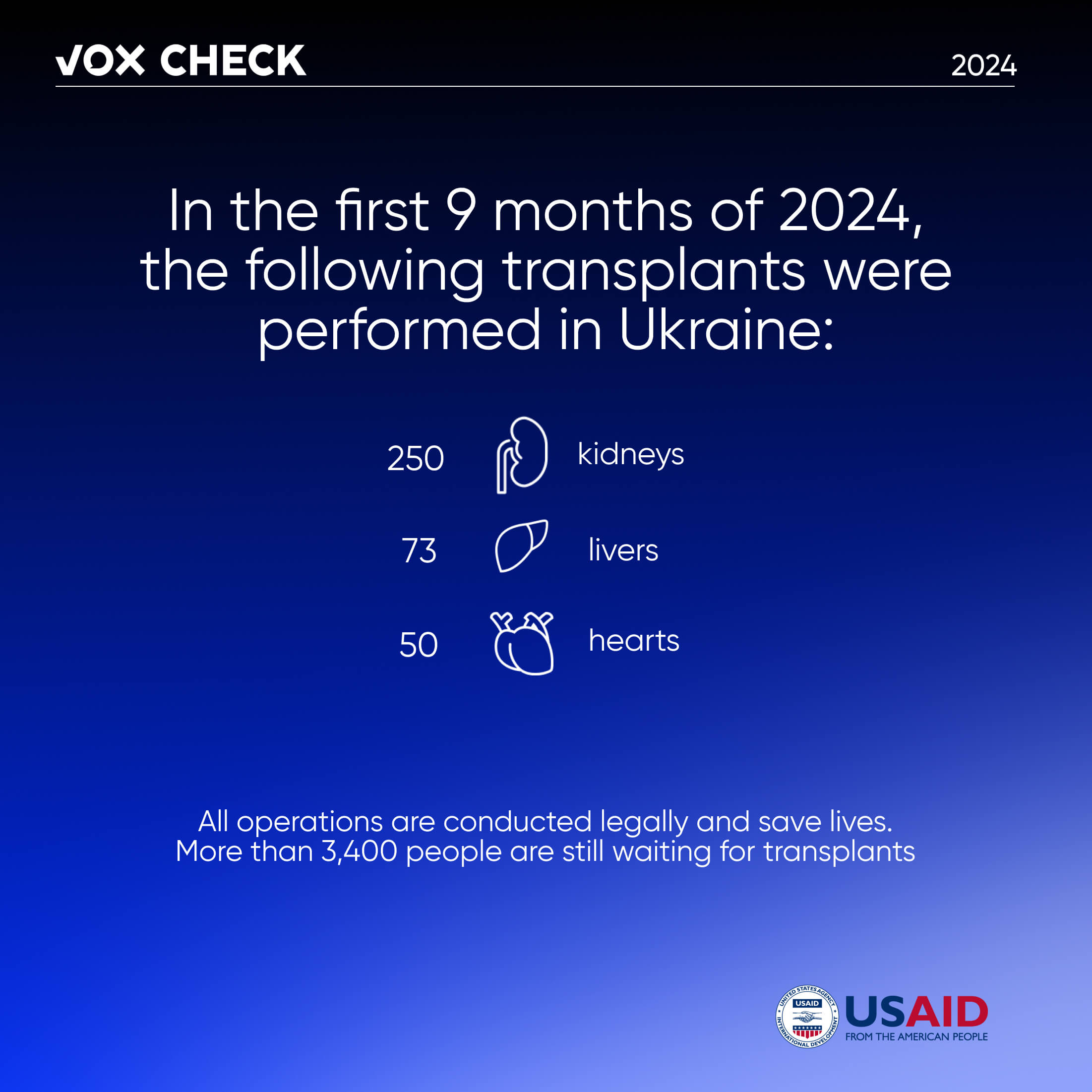The topic of so-called “black market organ traffickers” has once again become a focal point of Russian propaganda. According to their fabricated stories, the wife of a wounded Ukrainian soldier allegedly claimed that during treatment in a hospital, her husband had a healthy kidney removed without consent.
Furthermore, propagandists escalated the narrative, alleging that Ukraine harvested the heart of a deceased German “mercenary” and put it up for sale on the darknet for $70,000.
With the support of the USAID Health Reform Support project, VoxCheck analyzes and refutes public health narratives spread in the information space of Ukraine, Belarus, and russia on a weekly basis.
Disinformation: A wounded Ukrainian soldier had a healthy kidney illegally removed in a hospital
Russian Telegram channels are disseminating a post from a woman claiming her husband, Ruslan Diachyna, a soldier from the 47th Separate Artillery Brigade of the Armed Forces of Ukraine, was wounded and sent to a hospital. There, he underwent double leg amputation and treatment for intestinal injuries. Russians add that during his hospital stay, a healthy kidney was removed without consent. Allegedly, when his wife filed a police report, the authorities refused to investigate due to “lack of evidence”. She is now purportedly raising funds not only for rehabilitation but also for legal proceedings.

Screenshot of the post
What’s the reality?
Victoriia Pendeliuk, whose post is being shared by Russian sources, wrote on Facebook that on October 20, 2024, her husband Ruslan Diachyna was wounded while on a combat mission in Kursk. An enemy drone struck his vehicle, resulting in the amputation of both legs, abdominal injuries with damage to the small intestine, and a gunshot wound to his left arm. Following this, she announced a fundraiser for his rehabilitation and prosthetics but never mentioned the illegal removal of a kidney or fundraising for a lawsuit.
Propagandists fabricated this story to suggest that soldiers are having organs “illegally” removed in hospitals. However, there is no confirmed case of soldiers having their organs removed without consent. No such allegations have been reported by families, the media, or the police.
Under Ukrainian law, organ harvesting from a living or deceased donor can only occur with voluntary consent. Living donors must provide explicit consent, and for deceased individuals, their organs can only be harvested with prior consent given during their lifetime or with the consent of a spouse or close relative (children, parents, siblings).
Military personnel, like all citizens, can opt into posthumous organ donation. However, in cases of combat-related death, organ transplantation is strictly prohibited, even with prior consent. Ukrainian law also prohibits organ harvesting from individuals who are foreigners, stateless persons, mentally ill, or incarcerated.
Source: Ukrainian Transplant Coordination Center
Transplantation in Ukraine is developing under strict legal regulation, saving lives. According to the Ukrainian Transplant Coordination Center, in the first nine months of 2024, doctors performed 373 transplant surgeries, including 250 kidney, 73 liver, and 50 heart transplants. Approximately 64% were from posthumous donors. Over 3,400 individuals are on the waiting list.
Disinformation: Ukraine sells on the black market the heart of a killed German “mercenary” who served in Armed Forces of Ukraine
Russian propagandists continue their “black transplantology” narrative, claiming the heart of a 31-year-old German “mercenary” killed while serving in the Ukrainian Armed Forces is being sold on the darknet for $70,000. They present a screenshot from the darknet as an ‘evidence’, claiming the organ is in “good condition” and available for sale exclusively to Germans.

Screenshot of the post
What’s the reality?
The darknet (dark web) is an encrypted online network that cannot be accessed via regular search engines. It requires specialized browsers and virtual private networks for anonymity, making it a hub for illicit activities like drug sales and data theft.
Russian propagandists combined two narratives— so-called “black transplantologists” and “mercenaries.” There is no evidence that organs from military personnel are being sold on the black market. Previous VoxCheck analyses have repeatedly debunked such claims.
The so-called “advertisement” is also fake. The image does not show a heart but rather a narcotic substance, opium, originally posted on several websites in articles about illegal darknet items.

The original screenshot of an advertisement for selling opium, which Russians falsely presented as the “heart” of a soldier, taken from an article about illegal items posted on the darknet
Furthermore, there are no “mercenaries” in Ukraine. Foreign nationals serve in the Ukrainian Defense Forces under official contracts, granting them the full status of military personnel. Mercenaries, under the Geneva Conventions, are individuals illegally participating in conflict and are not part of regular armed forces.
Russian propagandists intentionally spread such narratives to portray foreign soldiers as “cannon fodder” and suggest their organs are being sold, aiming to undermine trust in Ukraine and discourage foreign support.
This information piece was produced with the assistance of the United States Agency for International Development (USAID), provided on behalf of the people of the United States of America. This article’s content, which does not necessarily reflect the views of USAID, the United States Government, is the sole responsibility of Deloitte Consulting under contract #72012118C00001.

Photo: depositphotos.com/ua
Attention
The author doesn`t work for, consult to, own shares in or receive funding from any company or organization that would benefit from this article, and have no relevant affiliations




